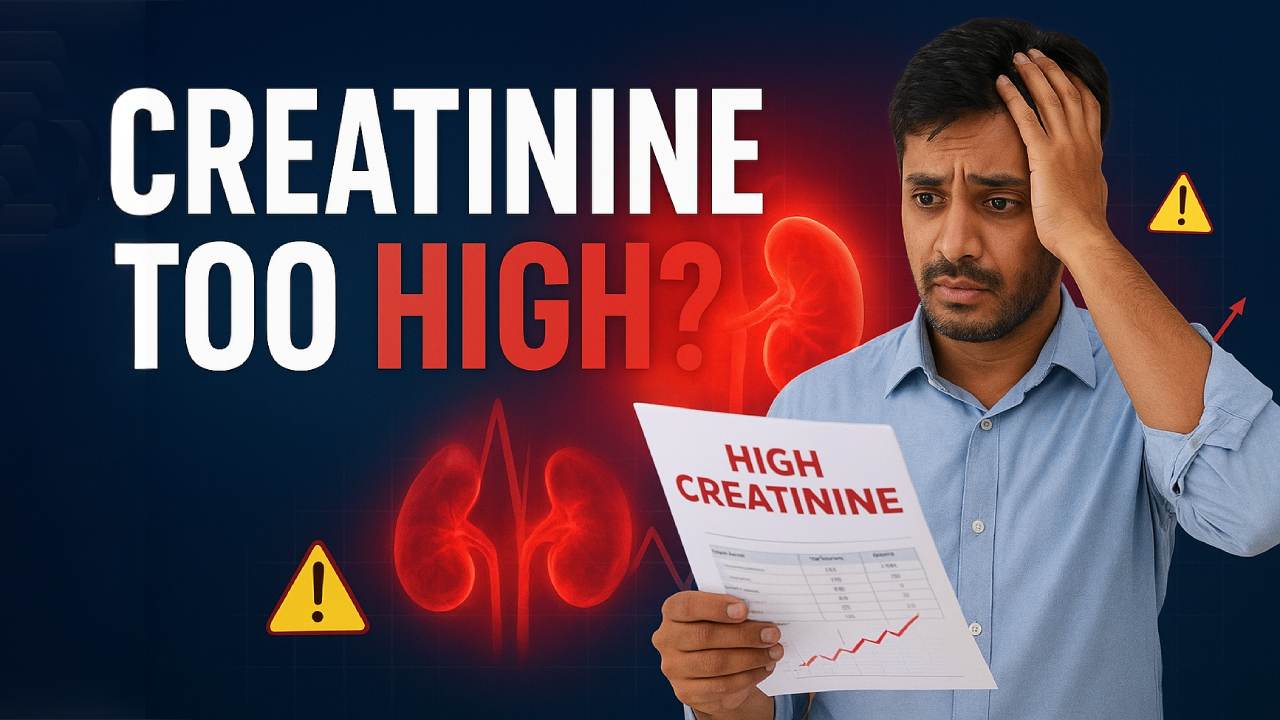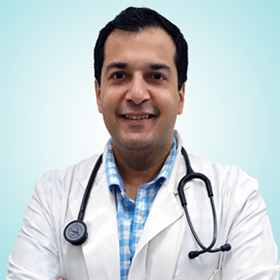How to Reduce Creatinine Level Naturally & Medically: Expert Guidance You Shouldn’t Ignore
Verified By Dr. Mohit Gupta | 15-Nov-2025
Dr. Mohit Gupta, Consultant Nephrologist at Kailash Hospital, Greater Noida, reviews a patient's blood report with a careful eye. "When a patient sees a high creatinine value on their report, panic is often the first reaction. But creatinine is not the enemy; it's a crucial messenger telling us that the kidneys, the body's silent filtration plant, need attention. The goal isn't just to 'reduce creatinine' with quick fixes, but to address the underlying reasons and protect kidney function for the long term."
A high creatinine level is a primary indicator of impaired kidney function. In a region like Greater Noida, where factors like diabetes, hypertension, and unpredictable hydration are prevalent, kidney health is a significant concern. This definitive guide, drawing on the expertise of Dr. Mohit Gupta and the advanced renal care team at Kailash Hospital, Greater Noida, will demystify creatinine and provide a science-backed, practical roadmap to manage its levels effectively.
Table of Content
To manage creatinine, one must first understand what it is. Creatinine is a waste product generated by your muscles from the normal breakdown of a compound called creatine, which is used for energy.
- The Kidney's Role: Your kidneys are designed to filter this waste out of the blood and excrete it through urine.
- The Warning Signal: When kidney function declines, their filtering capacity reduces. This causes creatinine to build up in the bloodstream. Therefore, a rising creatinine level is a key sign that the kidneys are not working optimally.
"Think of your kidneys as a sophisticated water filter," explains Dr. Mohit Gupta. "When the filter is clean, waste is efficiently removed. But if the filter gets clogged or damaged, impurities start to accumulate in the water. Creatinine is one of those 'impurities' we measure to check the filter's health."
Also read: Are Painkillers Harming Your Kidneys? What You Need to Know
Understanding the cause is the first step toward effective management. The causes can be broadly categorized:
1. Chronic Medical Conditions:
- Diabetes (Diabetic Nephropathy): Uncontrolled blood sugar can, over years, damage the delicate blood vessels in the kidneys.
- High Blood Pressure (Hypertensive Nephrosclerosis): Persistent high pressure can strain and injure the kidney's filtering units (nephrons).
- Glomerulonephritis: Inflammation of the kidney's filtering units.
2. Acute Factors (Sudden Onset):
- Dehydration: This is a common and often reversible cause. Less fluid in the body means less blood flow to the kidneys, reducing their filtration efficiency and causing a temporary creatinine spike.
- Certain Medications: Long-term or high-dose use of painkillers like NSAIDs (e.g., Ibuprofen, Diclofenac), some antibiotics, and others can be toxic to the kidneys.
- Obstructions: Kidney stones or an enlarged prostate can block the flow of urine, causing waste products to back up into the kidneys.
- Excessive Protein Intake: A very high-protein diet can increase the production of creatinine, putting extra load on the kidneys.
If your creatinine is high, a top nephrologist in Greater Noida will not just look at a single number. The diagnosis involves a comprehensive evaluation available at a best hospital in Greater Noida like Kailash Hospital.
- Serum Creatinine Test: The basic blood test.
- Glomerular Filtration Rate (eGFR): This is a more accurate calculation of how well your kidneys are filtering. It considers your creatinine level, age, gender, and other factors.
- Urine Tests: To check for protein (albumin) in the urine, which is an early sign of kidney damage.
- Imaging: An ultrasound or CT scan to look at the size, structure, and for any blockages in the kidneys.
"Self-treating a high creatinine level based on internet advice can be dangerous," warns Dr. Gupta. "For instance, drastically increasing water intake can be harmful if the patient has advanced kidney disease. At Kailash Hospital, Greater Noida, we determine the root cause and create a personalized plan that is both safe and effective."
Also read: How to Lower Uric Acid Levels Naturally: Tips from a Specialist
Managing creatinine is about making sustainable lifestyle and dietary changes under medical supervision.
1. Dietary Modifications (The Renal Diet)
Diet is a cornerstone of kidney health. The key is to reduce the kidney's workload.
- Monitor Protein Intake: While protein is essential, excess amounts increase creatinine production. Your dietitian will recommend the right amount and source (like egg whites, lean chicken) based on your stage of kidney disease.
- Reduce Sodium (Salt): High salt intake raises blood pressure and causes fluid retention, straining the kidneys. Avoid added table salt, papad, pickles, processed foods, and packaged snacks.
- Limit Potassium and Phosphorus: In advanced kidney disease, these minerals can build up. This means moderating foods like bananas, oranges, potatoes, tomatoes, nuts, and dairy products, as advised by your doctor.
- Avoid Creatine Supplements: Commonly used by gym-goers for muscle building, these supplements directly increase the creatinine load on the kidneys and should be strictly avoided.
2. Fluid Management: Hydration is Key
- Stay Hydrated: Dehydration is a common and reversible cause of high creatinine. Drinking adequate water throughout the day helps the kidneys flush out waste efficiently.
- What is Adequate? The right amount varies. For some, 8-10 glasses are enough; for others with advanced disease, fluid may need to be restricted. Your nephrologist will give you a personalized target.
3. Medication Review and Management
- Review Your Meds: Provide your nephrologist with a complete list of all your medications, including over-the-counter painkillers, which can be harmful.
- Manage Underlying Conditions: Strictly controlling blood sugar (if diabetic) and blood pressure is non-negotiable. This often involves taking prescribed medications consistently to prevent further kidney damage.
4. Lifestyle Adjustments
- Regular, Moderate Exercise: Intense, strenuous exercise can temporarily raise creatinine by breaking down muscle tissue. Opt for consistent, moderate activities like walking, swimming, or cycling.
- Quit Smoking and Limit Alcohol: Smoking damages blood vessels, including those in the kidneys, while alcohol can cause dehydration and blood pressure fluctuations.
- Maintain a Healthy Weight: Obesity increases the risk of diabetes and hypertension, the two leading causes of kidney disease.
Also read: Learn How to Pass Kidney Stones and Prevent Future Ones
Managing kidney health requires a dedicated, expert team. The Department of Nephrology at Kailash Hospital, Greater Noida offers a holistic approach.
- Expert Diagnosis: Led by top nephrologist in Greater Noida like Dr. Mohit Gupta, the team specializes in accurately diagnosing the cause of high creatinine.
- Personalized Diet Plans: Certified renal dietitians create tailored Indian diet charts that are practical, culturally relevant, and effective.
- Advanced Treatment: From managing early-stage disease to providing state-of-the-art dialysis and planning for kidney transplants, the hospital offers the full spectrum of renal care.
- Patient Education and Support: The team empowers patients with the knowledge to manage their condition effectively, reducing anxiety and improving outcomes.
A high creatinine level is a call to action, not a cause for despair. The journey to managing it is not about drastic, short-term fixes but about consistent, mindful choices in diet, hydration, and medication.
As Dr. Mohit Gupta of Kailash Hospital, Greater Noida concludes, "Your kidneys are remarkable organs capable of great resilience. By partnering with your nephrologist, you can take proactive steps to control the controllables. Ignoring the message that high creatinine sends can lead to irreversible damage. But with timely intervention and a disciplined approach, we can often slow the progression, preserve kidney function, and maintain a high quality of life. Your first step is the most important—getting a proper evaluation."
Do not ignore the warning signs. Schedule a consultation with a nephrologist at Kailash Hospital, Greater Noida, to protect your kidney health today.



 +91-9711918451
+91-9711918451
 international.marketing@kailashhealthcare.com
international.marketing@kailashhealthcare.com







